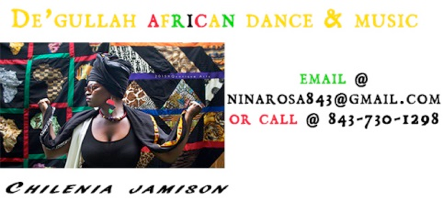A Touch of Africa!
ELE Experience: Students will experience the life of African and Gullah cultures through song, dance and communication. Students will learn a traditional African dance and chant to get an understanding as to how African dance was heavily incorporated by former slaves during slavery in Charleston, SC in the early 1800s. (See complete lesson on additional link)
Program Description: Students experience a touch of the culture of Africa through dance and music instruments; Nubian and modern rhythms that contain mathematical structure, communication and also songs!
They will learn fun facts about the motherland; such as what is the largest island in Africa, the largest river, tallest mountain, etc. Students will also learn different terms as to how to communicate with each other in Afria’s key language, Swaheli.
SAMPLE LESSON
The young explorers will use Gullah terms to interact with each other, to help build their communication skills and learn how Charleston SC is heavily influenced by African culture. Students will engage in a stretch exercise to prepare their muscles, get their heart rates going and and practice breathing patterns to understand need for a healthy body in order to A traditional African dance of the students choice will be selected for them to learn and develop the movements and make them their own. Next, students will learn a traditional African/Nubian chant that compliments the dance learned previously. Learning the meaning of the songs and dances and how they were implemented through Gullah people in Charleston SC during and after slavery in the early 1800s. Students will perform their created dance and songs.
Experience Outcomes:
By the end of the program students will be able to:
Communicate briefly in the language of Swahili (Africa’s key language).
Express and liberate themselves through African dance movements.
Demonstrate a full body stretch exercise.
Perform a sequenced ballet formation African dance by the name of Cassa.
Recite 2 traditional African chants.
Create a head garment such as a crown or kufi.
Have knowledge on things to eat to obtain a healthy lifestyle.
Recite several African natural resources, and also have knowledge on fashion trends worn in the past and in the present days throughout the villages.
Perform a dance for their fellow school mates, principals and teachers.


